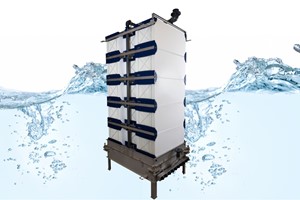Researchers from the University of Bath in the UK have developed a 3D-printed small block structure, or monolith, capable of filtering out perfluorooctanoic acid (PFOA), one of the most prevalent “forever chemicals” in water. PFOA belongs to the class of chemicals known as PFAS (per- and polyfluoroalkyl substances), notorious for their persistence in the environment and potential health risks.
The research team, using a special material called indium oxide, created lattices through 3D printing to maximize surface area, which is crucial for the filtration process. These lattices were then assembled into monoliths measuring four centimeters in length. Within just three hours, these monoliths were able to remove 53% of PFOA from water. Impressively, by heating the monoliths to 500°C and reusing them three times, the researchers achieved a removal rate of up to 75%.
Dr. Liana Zoumpouli, a research associate in the University of Bath’s Department of Chemical Engineering and one of the study’s authors, emphasized the significance of their findings: “PFAS, or ‘forever chemicals,’ are a major focus in water treatment and public health. We have created an efficient way to remove these chemicals from water without using lots of energy. Using 3D printing to create the monoliths is relatively simple, and it also means the process should be scalable. 3D printing allows us to create objects with a high surface area, which is key to the process.”
The innovative method offers a promising approach to address the growing concerns around PFAS contamination. These chemicals, initially used for their non-stick and water-repellent properties, have been widely utilized in products ranging from cookware to firefighting foams, clothing, and cosmetics. Over time, PFAS have entered the environment through wastewater discharges, landfills, and air emissions, posing significant threats to ecosystems and human health. Exposure to PFAS has been linked to severe health issues, including kidney and testicular cancer, liver damage, thyroid disease, weakened immune systems, and reproductive problems.
Professor Davide Mattia, another author of the study, highlighted the potential impact of this research: “Currently, these chemicals are not strongly regulated in the UK in drinking water, but there are guidelines, and we expect changes in policy quite soon. Water companies are likely to be looking at integrating systems to deal with them.”
Though the study's findings are promising, experts like Hugo Carronnier, a project manager specializing in PFAS at the pollution control company Valgo, have pointed out that the technique is still in the laboratory stage. Carronnier, who was not involved in the study, acknowledged the potential of the approach, stating, “These are good efficiency rates, according to the publication. It's promising, we'll have to see how it develops in the future because it’s currently on a laboratory scale.” He also noted that researchers will need to address challenges such as the effectiveness of the filters on a broader range of PFAS, improving the filters' yield and speed of absorption, and managing the risk of creating waste.
As the scientific community continues to explore new methods to combat PFAS contamination, the 3D-printed monoliths represent a significant step forward in the effort to safeguard public health and the environment from these persistent and harmful chemicals.













